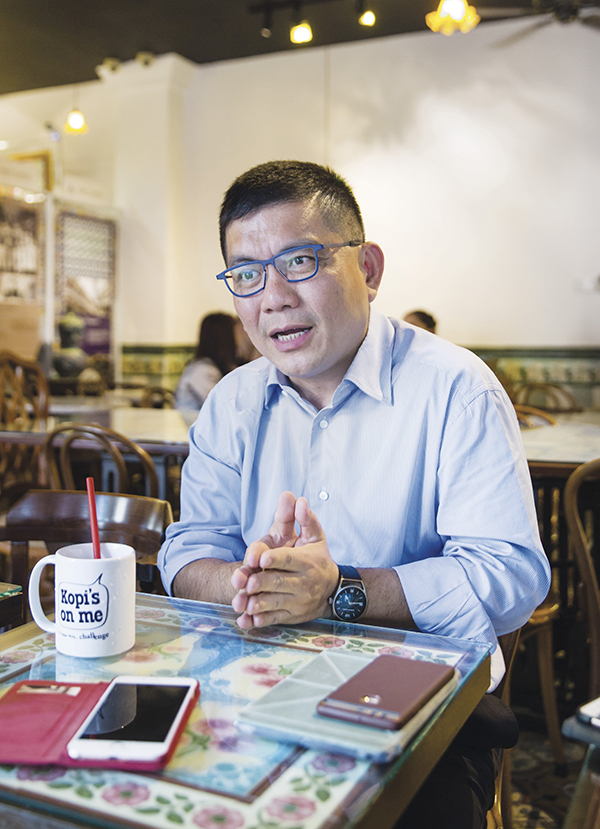"Why Put The Fate Of Digital Government In Someone Else's Hand?"
.jpg)
So you ask the obvious question: “What’s a guy like you doing in a place like this?”
Mr Chan was a private sector man before becoming the Government Chief Information Officer with the IDA, and now the Government Technology Agency (GovTech). An accountant by training, he spent two decades of his career working on IT systems and strategies in organisations such as CT Corporation (Indonesia), Ernst & Young, Barclays and Citibank.
Would he fit into a public service culture? “I spoke to many people before finally taking the [IDA] job,” he recalls. “The public sector is a whole new animal altogether. Some asked me, ‘Are you crazy?’”
Ultimately, it was neither money nor rank that sealed his decision, but his hunger for a challenge. “I told them [the IDA’s senior management] I didn’t want to join them for enterprise IT [large-scale IT for the Public Service]. But I need the leverage to change things a little bit.”
.jpg)
After getting assurance that he would have the autonomy he desired, Mr Chan came on board in April 2014. His aim was to bring the government closer to citizens through innovative digital services, by first bringing tech expertise back in-house.
Attracting the best talent into the government to build the services it needs is also “the best way for local firms to wake up” and create value again, says Mr Chan. By the late ’90s, rising costs in Singapore had led to most of the technology work being outsourced. Hoping to get Singapore’s IT firms to recover some lost glory, Mr Chan is leading by example.
Bringing expertise back
Right away, Mr Chan stumbled on an opportunity to stir the pot. In a coffee catch-up with Mr Mark Lim, a colleague, he sussed out that Mr Lim and a small band of like-minded public officers were creating digital applications for government services — in their private time and without their supervisors’ knowledge. The group was excited about the potential of their experiments, but hesitant to seek official approvals.
“Mark thought I was going to shut him down,” Mr Chan says with a grin. Instead, Mr Chan said he would grow the team to 300 people in a few years.
“We needed a digital and data analytics team in-house. Why put the fate of digital government in someone else’s hand?” he says.
Mr Chan had to sell his vision of turning the government into a powerhouse of internal capabilities to key decision-makers, such as Head of Civil Service Peter Ong and heads of departments. He also had to convince the Ministry of Finance to fund that vision.
With their support, Mr Lim’s secret club blossomed into the Government Digital Services (GDS). Today, it is home to 120 staff creating not just government apps, but also a whole new way of working within the IDA.
Creating change from within
Hiring people was Mr Chan’s next challenge: to convince people used to the uber-creative, open environment of start-ups and tech powerhouses like Google to join the Public Service, which is often associated with stifling bureaucracy.

“It was painful,” he recalls. “When I went out there and tried to hire good people from the industry, they said, ‘You’ve got to be joking.’ It was like getting vegetarians to eat meat.”
But he persisted. Hiring high-calibre people was critical to his vision of building a world-class tech team at the IDA and now, GovTech.
“People join because of other people,” he says. So in order to attract the first talents, he convinced human resources to relook how coders, developers and those with the technical skills are assessed, and to explore a new career track for such talent. Before that, “we were a technical organisation with no technical track,” Mr Chan says.
Mr Chan also physically isolated the GDS (housed in a 13,000-square-foot space at the Sandcrawler in Fusionopolis) in a deliberate effort to uncouple its working culture from the rest of the IDA’s. There, he implemented cross-functional squads that came together and disbanded, so that staff with different skills — coders, designers or psychologists — got a chance to shine at different phases in a project.
Breaking boundaries
He also brought in a particular ethos from his private sector experience.
For one, he prepares his own presentations. And “I don’t want anyone calling me by my title,” he says, “I’m here to work with you.”

In bureaucracy-ridden work environments, the safest thing to do, Mr Chan explains, is to say no and “not do anything”. When told that it was “the rule” that government data cannot be stored on public data clouds, he read every word in the rulebook on the subject, and discovered that the rule only applied to certain classifications of data.
“So, we went forward and started establishing first that unclassified data can indeed reside on the public cloud. We are now working on restricted data. Let’s see how that works out.”
More importantly, Mr Chan has started pushing out this new way of doing government IT to the rest of the Service. He is encouraging the GDS staff to work for different government agencies, and bringing other IDA officers into the GDS. “We have reached a critical mass and can start pushing people out to help each agency create their own teams.”
As for the issue of separating Internet access for public officers, he says: “The problem of security is not going to get better. You will have to keep investing in security measures and at a certain point, it is impossible to catch up.”

He explains that the government did what it thought was in the best interest of cyber security, instead of kicking the can down the road.
In fact, he was one of the first “guinea pigs” to work without Internet access on his office computer, Mr Chan reveals, adding that far from being an overnight decision, the measure was implemented after six years of debate.
Leadership is about having the courage to do the right things and making tough decisions, he asserts. He adds that while everyone at the senior level understood, others may still be “between the anger and bargaining stage”, drawing similarities between this change management journey and the five stages of acceptance.
And embracing change, whether in his switch to the public sector or making waves within his organisation, is all part of Mr Chan’s adventurous spirit.
“My wife has given up on me a long time ago,” he jokes about his family’s reaction to his career move. “I’m not a person who likes total stability. Thinking outside the box and creating keeps me coming to work each day with a smile.”

What’s in your daily cuppa?
Green tea
How often do you have it?
Three to four times daily
Where do you have it?
At home
- POSTED ON
Sep 1, 2016
- TEXT BY
Radhika Dhawan Puri
- PHOTOS BY
Norman Ng
-
Deep Dive
Digital Zeitgeist









